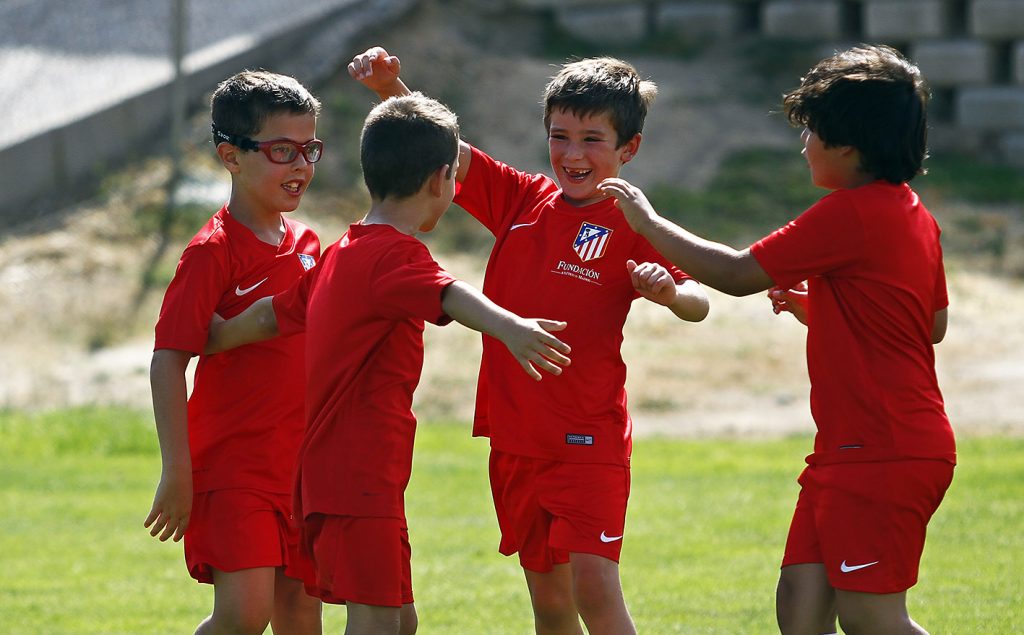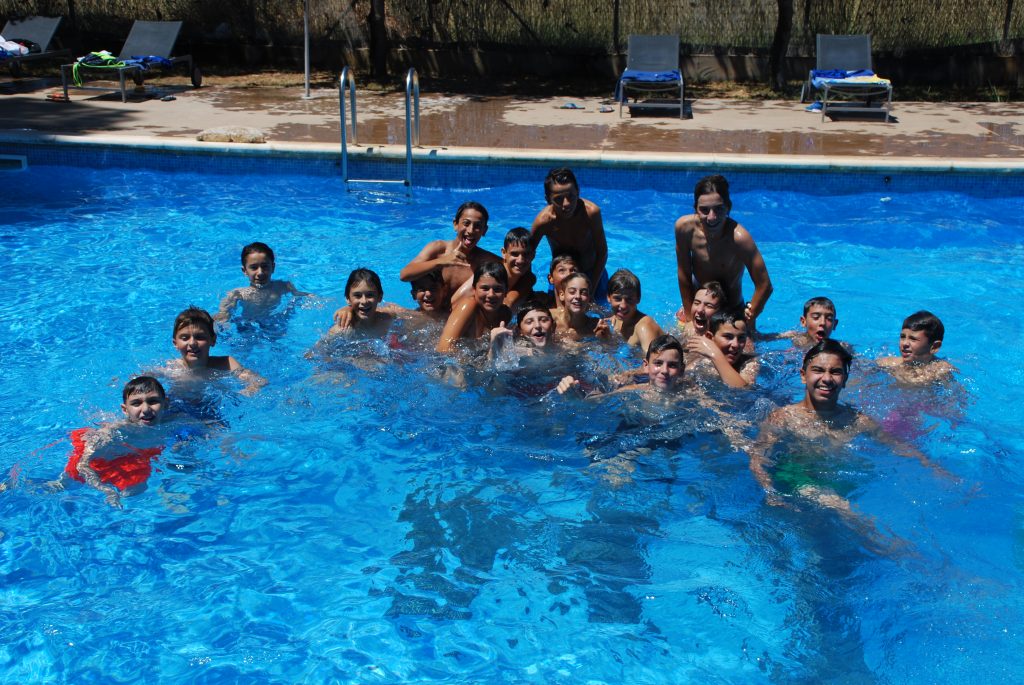Self-esteem, or the perception of oneself and one’s self-worth, is important for children, teenagers, and adults alike. Children with high self-esteem are more likely to experience academic achievement, success, satisfaction in relationships, and overall happiness. Although self-esteem can change throughout our lives, much of our self-esteem is developed during our early childhood. That’s why it’s important to consider studying the importance of self-esteem and to learn how to improve your child’s self-esteem.
Sending your child to a summer soccer camp is a great way to boost your child’s self-esteem. By doing so, you encourage their goals, they make friends, you show that you believe in their talent, etc. Before discussing in detail, let’s discuss why self-esteem is so important.
Table of contents
Part 1: The importance of developing self-esteem at an early age
- They trust their own abiliy to make decisions.
- They’re more likely to be leaders.
- They feel confident to cope with life’s challenges.
- They’re more likely to take risks and step out of their comfort zone.
- They perform better at school, at home, and with friends.
Part 2: 6 ways to raise children with high self-esteem
- Encourage your children to pursure their goals and dreams.
- Encourage their hard work and effort in pursuing their goals.
- Show interest in what your children are learning at school.
- Encourage your children to do things they’re good at and enjoy.
- Encourage your children to make friends and get along.
- Send your children to a summer camp to cover all the above.

The importance of developing self-esteem at an early age
Children with high self-esteem:
Trust their own ability to make decisions
Children with high self-esteem trust in their ability to make decisions. As a result, they’re less likely to seek approval from others which means they’re also less likely to succumb to peer-pressure. They make their own decisions.
At the same time, children with high self-esteem are open to considering the opinions of others and taking these opinions into account to make their own decisions.
More likely to be leaders
This self-confidence while at the same time respecting other’s opinions makes children with high self-esteem great leaders. Since they’re not seeking the approval of others, they can evaluate choices objectively and choose the right option based on facts.
Of course, they consider the opinions of others, but they don’t make decisions based on popular opinion. Rather, they make decisions based on their experiences, research, personal opinion, and intuition.
Feel confident to cope with challenges in life
Of course, children with high self-esteem trust in their own ability to make decisions which also means they trust in their ability to make the proper decisions to overcome challenges.
Likewise, most children with high self-esteem are also less likely to be perfectionists. On the surface, perfectionism may seem like a positive trait; however, perfectionists gain their confidence from external events like their successes or their failures. As a result, perfectionists often fear failure and have difficulty coping with challenges in life.
Children with high self-esteem, on the other hand, draw their confidence from their stable, internal perception of themselves rather than from external events like their immediate successes or failures. This means they find it easier to cope with life’s challenges.
More likely to take risks and step out of their comfort zone
Without the fear of failure, children with high self-esteem are more likely to take risks and step out of their comfort zone. Leaving the comfort zone helps children, teenagers, and adults discover new interests, new likes and dislikes, new perspectives.
When we leave our comfort zones, we learn more about ourselves and the world around us. We become more complete versions of ourselves, more satisfied with our lives and our ability to create the lives we want.
Children with high self-esteem aren’t afraid of failure and are therefore more likely to leave their comfort zones and create the lives they want for themselves.
Perform better at school, at home, and with friends
Children with high self-esteem perform better academically and have better relationships at home and with their peers. A study in the journal of applied sciences titled, “Relationship between self-esteem and academic improvement amongst pre-university students” found that high self-esteem is an important factor in strengthening the prediction of academic achievement in students.
Students with high self-esteem understand that failure is a result of a lack of effort, not a lack of ability. So while students with low self-esteem start to think, “There’s no point in trying,” children with high self-esteem think, “I’ll try harder next time.
When the students understand that their failures are a result of effort rather than ability, they exhibit a greater persistence to overcome their failures rather than developing an attitude of helplessness.

6 ways to raise children with high self-esteem
Parents play an important role in raising their child’s self-esteem. Self-esteem begins to develop at a very young age and results from the memory of success.
When babies and children begin to learn new things, it’s important for their parents to pay attention, let the child try, offer support, smiles, and show that they’re proud. The list below presents some great opportunities to improve your child’s self-esteem.
6 ways to raise children with high self-esteem:
1. Encourage your children to pursue their goals or dreams
It’s important to encourage your children to pursue their goals or dreams. By doing so, you’re showing your children that their ideas and their goals are important. You’re also showing them that you believe in them.
If your child wants to become a professional soccer player and you encourage them to follow their dream, they will most likely try their best in practice. Although they may not make it to the pros or at least reach their full potential and feel proud of all they’ve achieved as they pursued their dream.
On the contrary, if you dismiss your child’s dream, they’ll probably feel defeated and stop doing their best at practice. As a result, they won’t reach their full potential and won’t have much to feel proud of.

2. Encourage their hard work and effort in pursuing their goals
Encouraging your children to pursue their dreams isn’t enough by itself to raise their self-esteem. Self-esteem is highly associated with the memory of success. According to various studies, including one titled, “When we feel good and bad about ourselves: Self-esteem memories across cultures,” the memory of our past achievements improves our perception of ourselves and our self-worth.
That being said, hard work is the key to success. Motivational speaker Dr. Alan Zimmerman wrote an article titled “Hard work and success” where he mentions all the famous and successful people who attribute their success to hard work.
“Talent is cheaper than table salt. What separates the talented individual from the successful one is a lot of hard work.” – Stephen King, bestselling author
“You may have the loftiest goals, the highest ideals, the noblest dreams; but remember this, nothing works unless you do.” – Nido Quebein, author, consultant, and president of Highpoint University.
Check out this inspiring video from success expert Richard St. John who shares a similar perspective.
3. Show interest in what your children are learning at school
It’s also important to show your children that you’re interested in what they’re learning at school. At the end of the day, you’re a primary role model for your child. Your child wants to be just like you.
That means if you don’t show interest in your child’s school work, your child’s school work will cease to interest them. Without interest, they won’t feel as much internal motivation to do their homework and do well in school. After all, school doesn’t matter. It doesn’t matter to you. Why should it matter to them?
If you show an interest in what your child is learning, they’ll stay interested, and they’ll be more likely to work hard and be academically successful.
The same general rules apply in terms of their other interests. If your child is interested in soccer, it’s a good idea to show that you’re also interested… even if you’re not. If you show that you’re interested in soccer and in their development as soccer players, they’ll be more excited to share their improvement with you and therefore more likely to work hard.

4. Encourage your child to do things they’re good at and enjoy
It’s also important to encourage your child to do things they’re good at and enjoy. As we mentioned before, self-esteem is directly related to the memory of success. It stands to reason that the more success your child experiences, the higher their self-esteem will be.
Although hard work is the key to success, natural talent certainly helps. That’s why it’s important to encourage your child to do things they’re good at.
You might be wondering what to do if your child is really good at a specific activity but doesn’t enjoy it. Or what if they used to enjoy the activity a lot until it got more difficult? Should you let them quit or should you encourage them to continue?
It’s a difficult question to answer and very hot debate topic. This article from Lifehacker makes a great argument that you should make your decision based on your child’s personality and reasoning for quitting. Many children want to quit in the early days of their activity or sport because of anxiety. Others want to quit because they don’t handle losing well. Those children should be encouraged to stick to the sport. They can learn some valuable life lessons. Other children simply lose interest in their sport. In which case, there’s no point in insisting that they continue.

5. Encourage your children to make friends and get along
You should also encourage your children to make friends and get along with their peers. While high self-esteem is associated the memory of success and achievements, low self-esteem is more closely associated to social distress. So, it’s not only important to encourage your children to make friends and get along; it’s also important to teach your child social skills so they have the tools to make and keep friends.
Flintobox discusses 5 ways to improve your children social skills:
- Encourage them to maintain eye contact with you (e.g. staring contests).
- Teach them emotions by expressing your own emotions verbally and non-verbally (e.g. Say, “I’m upset,” while making a sad face).
- Encourage them communicate with you (e.g. Ask them about their day or their feelings).
- Give them the environment they need to communicate with their peers (e.g. Send them to a summer camp where they can practice making friends).
- Prepare them for higher social skills (e.g. conflict resolution, non-verbal communication, and assertiveness).

6. Send your children to a summer camp to cover all the above
Summer camp is a great opportunity to raise your child’s self-esteem especially if the summer camp is related to a specific sport or activity. By sending your child to summer camp to improve their sport or activity, you’re certainly encouraging them to pursue their goals or dreams, and you’re giving them the tools they’ll need to improve.
Summer camp is also the perfect opportunity to show interest in what your child is learning. When they call you up at night excited to tell you all about what they did at camp, be interested. Ask them questions. Let them know you care.
Furthermore, at summer camp, your child will be surrounded by other students who are just as passionate about their sport or activity as your child. Your child will be able to bond with the other students and make lifelong friendships and memories – memories of success they’ll need for the self-esteem.
Not to mention, camp counselors always encourage hard work and reward hardworking students with praise. Summer camps come with many benefits for kids. At summer camp, children renew their passion for the activity they love, make friends, and learn the value of hard work – all important for your child’s self-esteem.

Interested in sending your child to a summer camp?
It’s a great idea to send your child to a summer camp to improve their self-esteem. Additionally, summer camps offer children many other benefits. Sports camps specificially teach children the value of hard work and responsibility. Sports academies and boarding schools offer additional benefits. For example, students get to experience optimal health and fitness.
Choosing a summer camp can be difficult. There’s a lot to consider and usually a considerable investment on the line. However, there are some tips and tricks for choosing a summer camp. For example, it’s a good idea to define your main objective before you begin your search. For more tips, check out the step-by-step guide for choosing a summer camp.

